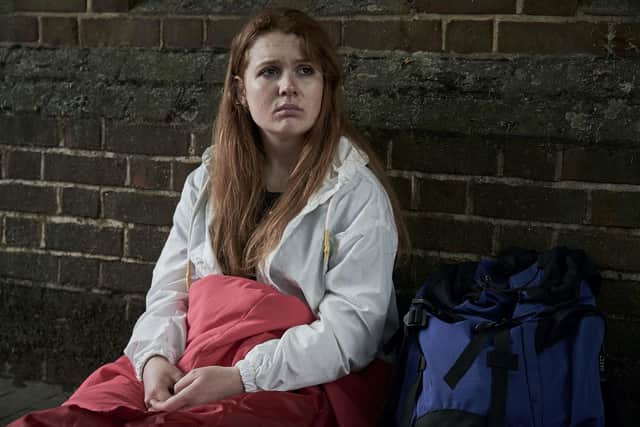Women more likely to be affected by homelessness than men, study finds after interviews in Sheffield
and live on Freeview channel 276
A report by homelessness support charity Shelter found that 60 per cent of homeless adults in temporary accommodation are women, despite them making up 51 per cent of the general population.
And, in the last 10 years, the number of homeless women in temporary accommodation has nearly doubled.
Advertisement
Hide AdAdvertisement
Hide AdDuring research, 34 women and one non-binary person who were either homeless or living in poor housing in Birmingham, Bristol and Sheffield were interviewed.


A key finding was domestic abuse is the third most common cause of homelessness, with a third of interviewees having experienced it.
Shelter said in 2011, 40,030 women were living in temporary accommodation, but that has risen by 88 per cent to 75,410 in 2021.
Polling carried out by YouGov and commissioned by the charity found that women are 36 per cent more likely than men to be in arrears or struggling with housing costs, with single mothers facing the most affordability issues, with almost one in three “constantly” struggling to keep a roof over their heads.
Advertisement
Hide AdAdvertisement
Hide AdFigures show that 69 per cent of women who privately rent worry they will not be able to afford anywhere "decent" if their relationship breaks down.
Research also found lone mothers faced additional barriers to support, which some did not seek out of fear that they would be separated from their children.
In September, a mother-of-five told the Star she had to sleep in her car for three months after she was unable to secure a roof over her family’s head due to her owing £1,300 in historic rent arrears.
Meanwhile, a council report found in February 2021 that the number of homeless people in Sheffield rose to 600 during the pandemic, due to a combination people unable to stay in their accommodation, housing staff shortages and lockdowns.
Advertisement
Hide AdAdvertisement
Hide AdPolly Neate, chief executive of Shelter, said women are bearing the brunt of the escalating housing crisis and “are being failed at every turn”.
She added: “No mother should have to choose between buying food or paying her rent. No woman should have to stay with her abuser or face the streets.
“The hike in living costs and cuts to Universal Credit mean it's only going to get tougher for thousands of women barely hanging on to their homes. It's appalling women are being fobbed off by professionals who are supposed to help them, and it's no wonder they feel scared and alone.”
A spokesperson for the Department for Levelling Up, Housing and Communities said: “These figures reflect the increase in support for vulnerable groups, which is preventing thousands of women from becoming homeless. However, we're clear that temporary accommodation should only be a last resort.
Advertisement
Hide AdAdvertisement
Hide Ad“Tackling homelessness is a Government priority - that's why we are spending £316 million on this in the next year to build on the success of the Homelessness Reduction Act, which has prevented 400,000 households from becoming homeless, or supported them to settled accommodation.
“We are continuing to work with councils and charities to meet our target of ending rough sleeping by the end of this parliament.”
Comment Guidelines
National World encourages reader discussion on our stories. User feedback, insights and back-and-forth exchanges add a rich layer of context to reporting. Please review our Community Guidelines before commenting.

